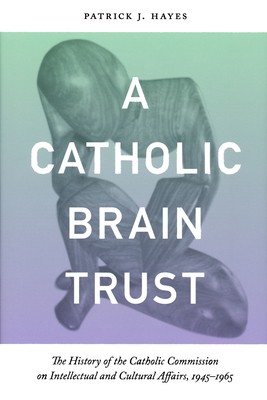
- We will send in 10–14 business days.
- Author: Patrick Hayes
- Publisher: University of Notre Dame Press
- ISBN-10: 0268031096
- ISBN-13: 9780268031091
- Format: 16 x 23.4 x 3.1 cm, hardcover
- Language: English
- SAVE -10% with code: EXTRA
Reviews
Description
In A Catholic Brain Trust: The History of the Catholic Commission on Intellectual and Cultural Affairs, 1945-1965, Patrick J. Hayes chronicles the founding, development, and accomplishments of the CCICA from its beginnings immediately following the Second World War to 1965. This extensively documented study contributes to the history of American Catholicism by investigating a little-known effort on the part of Catholic intellectuals in the postwar period to shape Catholic identity in the United States, by bringing their individual and collective resources to bear on contemporary society and culture. Hayes demonstrates how a group of leading Catholic professors, college presidents, writers, government officials, scientists, and artists influenced Catholic culture through various media, through educational institutions, and through their participation in ecclesial- or government-sanctioned activities.
After outlining the preliminary background of the CCICA's founding in 1946, Hayes examines its impact through two of its early projects: war relief for displaced scholars and participation in United Nations affairs. From 1948 to 1959, questions of the relationship between church and state especially occupied the Commission. Hayes looks at the impact of the famous lecture in 1955 by Monsignor John Tracy Ellis, "American Catholics and the Intellectual Life," which, more than any single event, served to rally CCICA members, as well as the larger academic community and the American Catholic Church as a whole, around the question of Catholic intellectual identity. Hayes analyzes the CCICA's influence on campus culture in the United States, touching on topics such as academic freedom and projects such as the Kirby seminars for younger scholars, a Catholic registry of academics working in the United States, and the New Catholic Encyclopedia. An epilogue treats the Commission's last years of operation.
EXTRA 10 % discount with code: EXTRA
The promotion ends in 17d.01:44:23
The discount code is valid when purchasing from 10 €. Discounts do not stack.
- Author: Patrick Hayes
- Publisher: University of Notre Dame Press
- ISBN-10: 0268031096
- ISBN-13: 9780268031091
- Format: 16 x 23.4 x 3.1 cm, hardcover
- Language: English English
In A Catholic Brain Trust: The History of the Catholic Commission on Intellectual and Cultural Affairs, 1945-1965, Patrick J. Hayes chronicles the founding, development, and accomplishments of the CCICA from its beginnings immediately following the Second World War to 1965. This extensively documented study contributes to the history of American Catholicism by investigating a little-known effort on the part of Catholic intellectuals in the postwar period to shape Catholic identity in the United States, by bringing their individual and collective resources to bear on contemporary society and culture. Hayes demonstrates how a group of leading Catholic professors, college presidents, writers, government officials, scientists, and artists influenced Catholic culture through various media, through educational institutions, and through their participation in ecclesial- or government-sanctioned activities.
After outlining the preliminary background of the CCICA's founding in 1946, Hayes examines its impact through two of its early projects: war relief for displaced scholars and participation in United Nations affairs. From 1948 to 1959, questions of the relationship between church and state especially occupied the Commission. Hayes looks at the impact of the famous lecture in 1955 by Monsignor John Tracy Ellis, "American Catholics and the Intellectual Life," which, more than any single event, served to rally CCICA members, as well as the larger academic community and the American Catholic Church as a whole, around the question of Catholic intellectual identity. Hayes analyzes the CCICA's influence on campus culture in the United States, touching on topics such as academic freedom and projects such as the Kirby seminars for younger scholars, a Catholic registry of academics working in the United States, and the New Catholic Encyclopedia. An epilogue treats the Commission's last years of operation.


Reviews